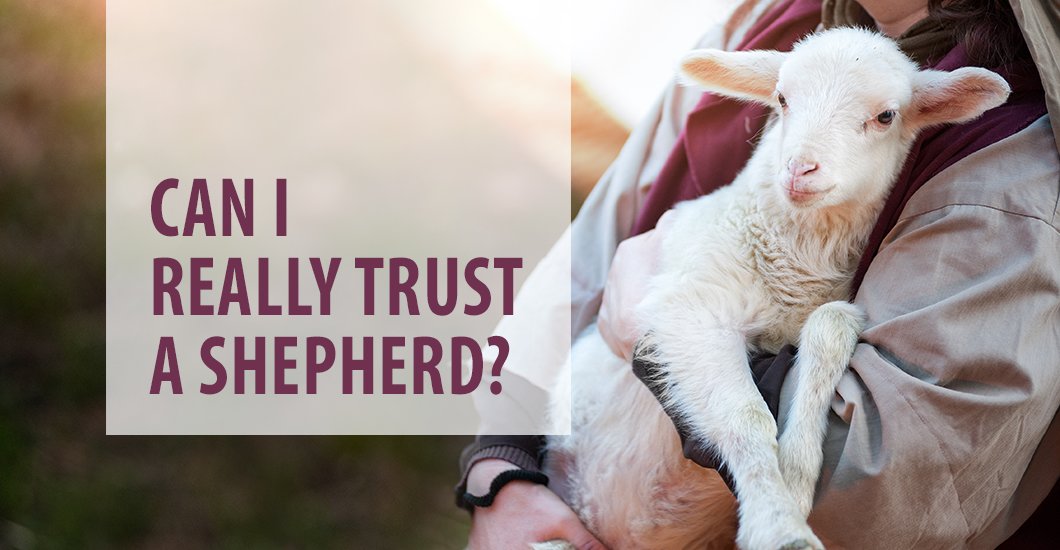Trending Articles
Can I Really Trust a Shepherd?
What could a shepherd possibly provide me that would leave me lacking of nothing? Though familiar with this famous Psalm, it was not until recently that I started to recognize it as a lesson in trust, which is something I seriously struggle to possess within my faith. Psalm 23 builds an understanding of the trustworthiness of Christ, especially when you consider the role of a shepherd in relation to his sheep.
Curious to know how this relationship looked, I searched in Google the “role and responsibilities of a shepherd” with regard to the care of his sheep. This gave me a great insight into that special bond between the two and enlightened me as to why Jesus uses this image in His teaching to help us see His role in our own lives. In calling Himself the “Good Shepherd,” the people first witnessing Him preach would understand the shepherd as protector, comforter and provider.
THE LOWLY SHEPHERD
Jesus, however, was not the first to use the bond between shepherd and sheep to teach; this image can be seen throughout the Old Testament as well. Though clearly this reference is a foretelling of the Messiah, who is Christ the Lord, the Old Testament provides many examples of those who made a living (at least at some point during their lives) in shepherding, such as Moses, Jacob, Abraham, King David and the prophet Amos.
Isaiah uses the shepherd imagery in his poetry as well: Like a shepherd he feeds his flock; in his arms he gathers the lambs, carrying them in his bosom, leading the ewes with care (Isaiah 40:11).
The shepherd was not typically seen as the most illustrious career path. This was a lowly position but incredibly crucial to the livelihood and lives of the people in the Old Testament as well as in the time of Jesus. As I read Isaiah’s description of the shepherd, my heart is moved by the tender, loving care evident toward the sheep. I am sure they were gruff shepherds working the pastures, but more often these men were clearly of great compassion. They certainly possessed a strong sense of protection for their charges. The more you know about being a good shepherd the more your heart will be filled with gratitude for Jesus the Good Shepherd.
WHAT A SHEPHERD DOES
Here are a few of the responsibilities of a shepherd and how they juxtaposition Jesus’ loving and tender care for us:
First, the shepherd is responsible for the flock’s welfare and safety. According to my research, sheep are not as dumb as they are often portrayed. They can, however, still get themselves into a lot of trouble. Do you see the comparison to people already emerging? Well-meaning sheep, who just want to graze upon the green pasture, have been known to myopically follow the grass, away from the flock and into harm’s way. Sheep can become lost, putting them in grave danger from predators or even stumble off a cliff while fixated on eating the grass before them.
How often have I become short-sighted in my own life? Losing my way or unaware of the danger and continuing on the path only to get hurt. My free will can be a real hindrance to my well-being some days. There are paths that look fulfilling but if I head down them apart from Jesus I am apt to find more harm than good. When I look back at Psalm 23, I see the benefit of staying near and following Christ: He guides me along the right path for the sake of his name (Psalm 23:3). In order for me to submit to the leadings of the shepherd, I have got to feel he has my best interests in mind. I have to trust him. This quote from the commentary on Psalm 23 from “The Didache Bible” encouraged this surrender as it again points out the closeness of shepherd and sheep. “This Psalm portrays God as one who knew the psalmist intimately and was with him on every step of his journey, in every moment of his life” [Cole, Jeffrey, Editor. “The Didache Bible: Ignatius Bible Edition”(RSVCE). Ignatius Press, 2014. Page 628].
AVOIDING SNARES
Second, the shepherd protects the sheep from predators. His ultimate concern is flock perseverance. Wolves, coyotes, foxes and mountain lions are all natural predators to sheep. The predators either seek the sheep out of hunger or stumble upon those that have lost their way. Saint Peter warns us that sheep are not the only ones with a natural predator and in need of protection: “Be sober and vigilant. Your opponent the devil is prowling around like a roaring lion looking for [someone] to devour” (1 Peter 5:8).
There was a time when I was ignorant to the “snares of the devil” (2 Timothy 2:26) to the point of even denying his existence, which is his greatest snare. Unaware of this danger, I was the most vulnerable. Gratefully like the sheep, Jesus pursued me. In Luke’s Gospel Jesus gives us another reason He pursues us when we are lost: “What man among you having a hundred sheep and losing one of them would not leave the 99 in the desert and go after the lost one until he finds it? And when he does find it, he sets it on his shoulders with great joy and, upon his arrival home, he calls together his friends and neighbors and says to them, ‘Rejoice with me because I have found my lost sheep.’ I tell you, in just the same way there will be more joy in heaven over one sinner who repents than over 99 righteous people who have no need of repentance” (Luke 15:4-7). Protecting us from the predator absolutely means preserving us for heaven. He values every single soul and rejoices for each one preserved for eternal glory.
CONSTANT CARE AND ATTENTION
Third, the shepherd is often trained to assist the sheep with health issues. Just like sheep, we are susceptible to diseases. Humans, being multifaceted beings, face more than just physical ailments. We must contend with our emotional and spiritual well-being as well. Jesus the divine physician is more than adequately equipped to tend to those needs.
In addition, like the shepherd who “will make frequent checks on the ewes at all hours of the day and night, and may assist the ewe if birthing problems occur,” Jesus is ever present with us. How comforting knowing that Jesus is constantly checking in on us throughout the day and through the night. His grace is abundantly available to assist us when we birth problems in our lives.
MY SHEEP KNOW MY VOICE
The last characteristic of the shepherd I wish to expound upon is the unique call each shepherd has to summon his flock. Each shepherd trained his sheep to recognize only his voice, so regardless of the number of shepherds sharing the pasture, they would have known to whom they belong and whom to follow. Knowing this, Jesus words from John’s Gospel, “I am the good shepherd, and I know mine and mine know me, just as the Father knows Me and I know the Father; and I will lay down My life for the sheep” (John 10:14-15) take on an even richer meaning.
To train our ears to hear only the Good Shepherd’s call we must spend time listening to him. Reading Scripture, the Word of God, is perhaps one of the most obvious places to learn His voice. In the Bible, we encounter the guidance of the Holy Spirit as Jesus’ very words and works are shared with us. In addition, we can hone our hearing through time in prayer and regular participation in the Sacraments.
WHAT SHEEP TEACH US ABOUT TRUST
So what does this all have to do with trust? A shepherd would lay down his life for his sheep. Jesus has done that for us as a great sign of His tender care. Unlike the shepherd laying down his life to protect his livelihood, Jesus did it out of His immense love for each and every one of us. Psalm 23 reminds us that He will not only make straight our paths but along that journey will satiate our thirst, lay a banquet before us, anoint us and bring us to the joys of life everlasting. We have nothing to fear and that is why this is a lesson in trust.
“May the God of peace, who brought up from the dead the great shepherd of the sheep by the blood of the eternal covenant, Jesus our Lord, furnish You with all that is good, that You may do His will. May He carry out in You what is pleasing to Him through Jesus Christ, to whom be glory forever [and ever]. Amen” (Hebrews 13:20-21).
Allison Gingras is the founder of ReconciledToYou.com - where she shares the beauty of the Catholic Faith with honesty, laughter, and relatable examples from every day, ordinary life! Her newest project is the Stay Connected Journals for Catholic Women (Gracewatch.Media/Connected) and includes her first book, The Gift of Invitation: 7 Ways Jesus Invites You into a Life of Grace. Allison hosts A Seeking Heart with Allison Gingras on BreadboxMedia.com; and is a Social Media Specialist for Kennedy Brownrigg Group and WINE: Women in the New Evangelization.
Latest Articles
Want to be in the loop?
Get the latest updates from Tidings!








